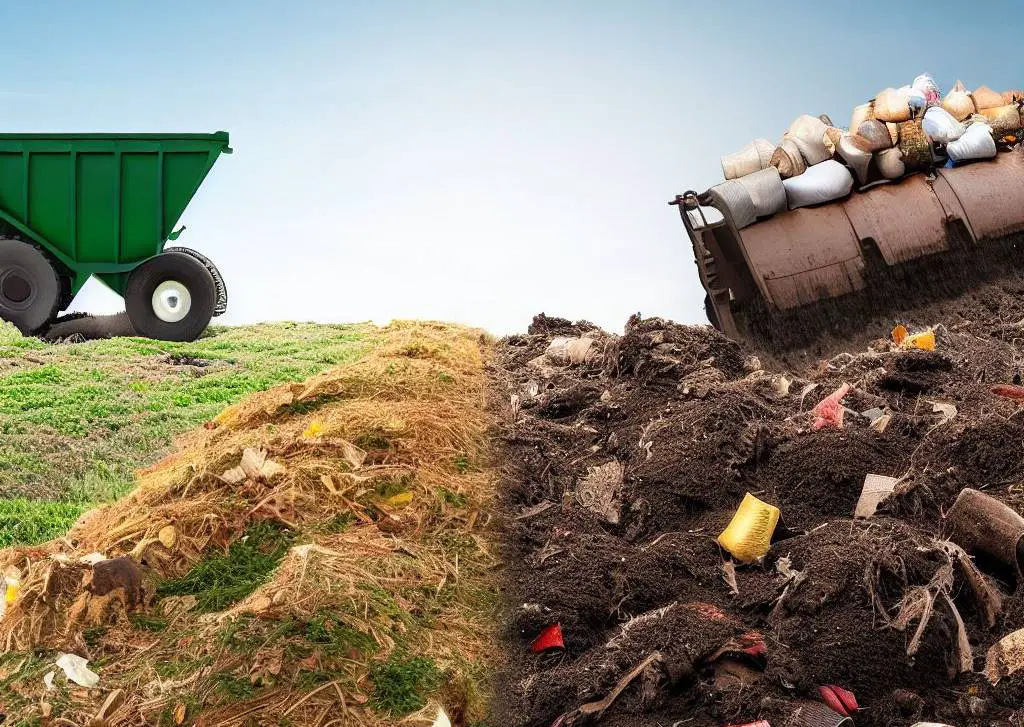Organic waste management is a pressing issue many of us face today. Did you know that organic materials, when dumped in landfills, degrade slowly and release harmful greenhouse gases? This blog will illuminate the differences between composting and landfill methods, highlighting the environmental impacts and benefits of each.
Stick around to discover why composting might just be your best bet for an eco-friendly lifestyle.
Key Takeaways
- Landfills produce methane, a strong greenhouse gas that contributes to climate change, while composting helps reduce greenhouse gas emissions.
- Landfills contribute to water and soil pollution through the production of harmful leachate, while composting practices help prevent these issues by diverting organic waste away from landfills.
- Composting produces nutrient – rich soil that supports healthy plant growth, reduces the need for chemical fertilizers, and closes the nutrient cycle in a sustainable way.
Composting Vs Landfill: Environmental Impacts of Landfills
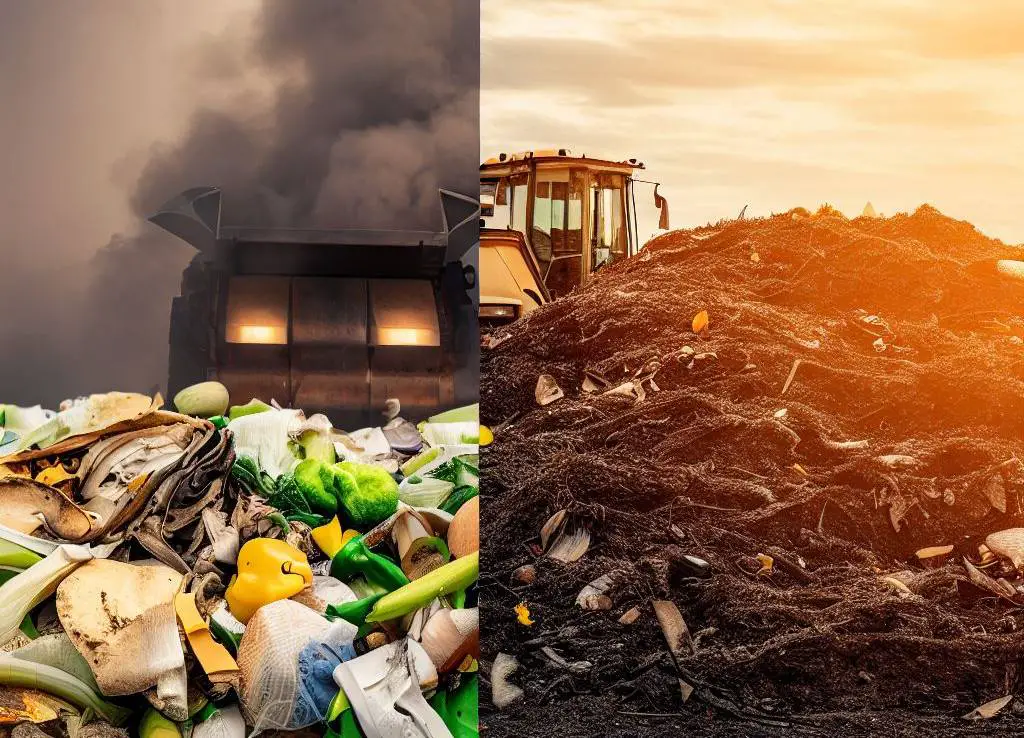
Landfills produce methane, which is a greenhouse gas that contributes to climate change.
Methane production
Landfills make a gas called methane. This gas is very strong and pushes our earth’s heat up. Once food waste is tossed in the landfill, it starts to break down but without oxygen. This process gives off methane gas into the air.
Methane helps to heat our planet more than other gases do. Composting food at home can cut this problem a lot. It can slow how fast the earth warms up by reducing the amount of methane made from landfills.
Water and soil pollution
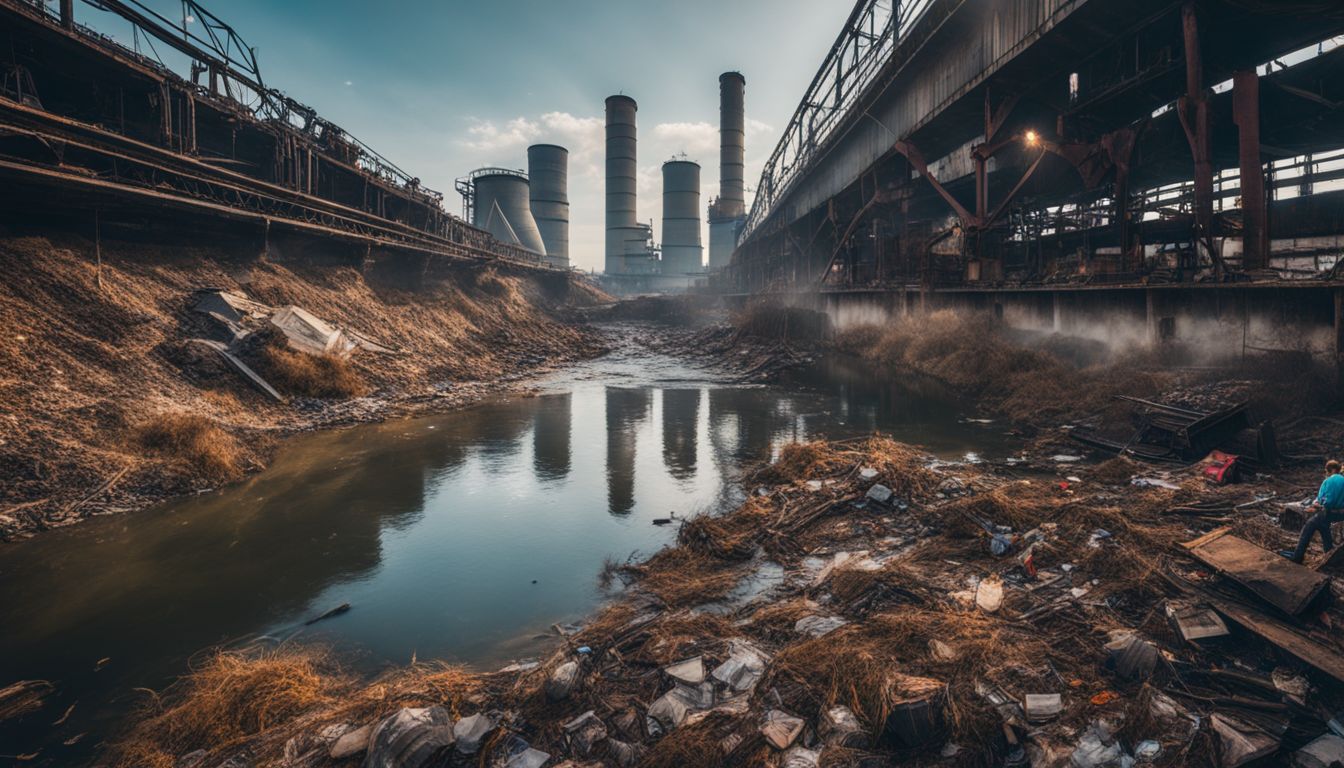
Landfills contribute to water and soil pollution. When organic waste breaks down in landfills, it produces a liquid called leachate that can contaminate nearby groundwater and surface water sources.
This leachate contains harmful chemicals and pollutants that can seep into the soil, impacting its quality and fertility. Additionally, when rainwater comes into contact with the waste in landfills, it can pick up toxic substances and carry them into nearby bodies of water, further polluting the environment.
This pollution poses a threat to aquatic life and can also affect human health if contaminated water is consumed or used for irrigation purposes. Proper composting practices help prevent these issues by diverting organic waste away from landfills, reducing the risk of water and soil pollution.
Greenhouse gas emissions
Composting is a better option than landfilling when it comes to reducing greenhouse gas emissions. When food waste ends up in landfills, it undergoes anaerobic decomposition, which produces methane gas.
Methane is a potent greenhouse gas that contributes to climate change. However, composting keeps organic materials out of landfills and allows them to break down quickly and naturally.
This helps to minimize the production of methane and other harmful gases that contribute to greenhouse gas emissions. By choosing composting over landfilling, we can make a positive impact on our environment by reducing our carbon footprint and mitigating climate change.
Benefits of Composting

Composting produces nutrient-rich soil, reduces methane emissions, and decreases the need for chemical fertilizers.
Nutrient-rich soil production
Composting is a great way to produce nutrient-rich soil that can help plants grow. When we compost organic waste, like food scraps and yard trimmings, they break down quickly and become compost.
This compost is full of nutrients that feed the earth and improve soil quality. It’s like giving the soil a healthy meal! Plus, using compost in gardens eliminates the need for chemical fertilizers.
So not only are we reducing waste, but we’re also helping the environment by recycling organic materials and supporting healthy plant growth.
Reduction of methane emissions
Composting plays a crucial role in reducing methane emissions. When organic waste is sent to landfills, it decomposes in an anaerobic environment, producing methane gas. Methane is a potent greenhouse gas that contributes to climate change.
However, when organic waste is composted instead, it breaks down efficiently in an aerobic environment with the presence of oxygen. This process helps to significantly reduce the production of landfill methane and its harmful effects on the environment.
By diverting organic waste from landfills and encouraging composting, we can take an important step towards mitigating greenhouse gas emissions and promoting sustainable waste management practices.
Decreased need for chemical fertilizers
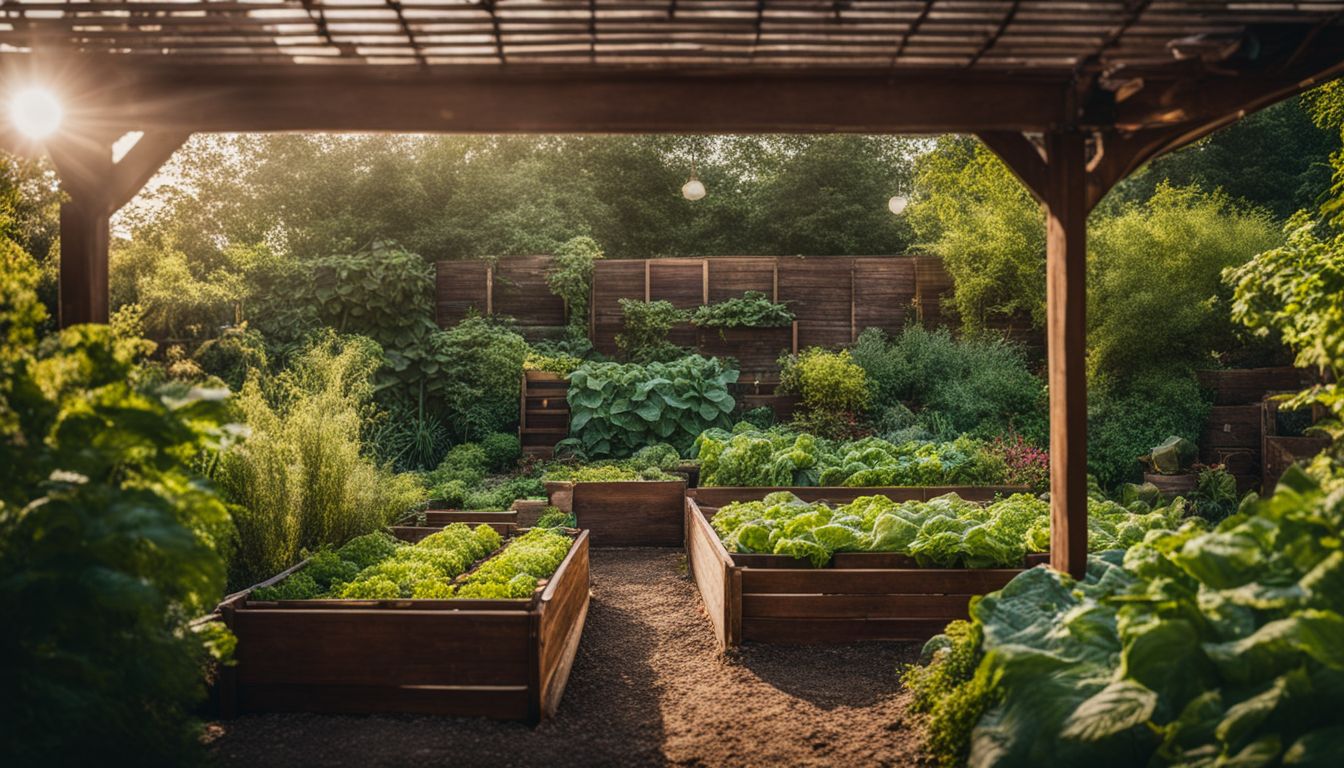
Composting reduces the need for chemical fertilizers. When organic waste is composted, it breaks down quickly and becomes nutrient-rich compost. This compost can be used to enrich soil and provide essential nutrients for plant growth.
By using compost instead of chemical fertilizers, we can promote healthy soil fertility and reduce our reliance on synthetic chemicals that can harm the environment. Composting closes the nutrient cycle by recycling organic materials back into the soil, creating a sustainable and natural way to nourish plants without relying on harmful substances.
Differences Between Aerobic and Anaerobic Composting
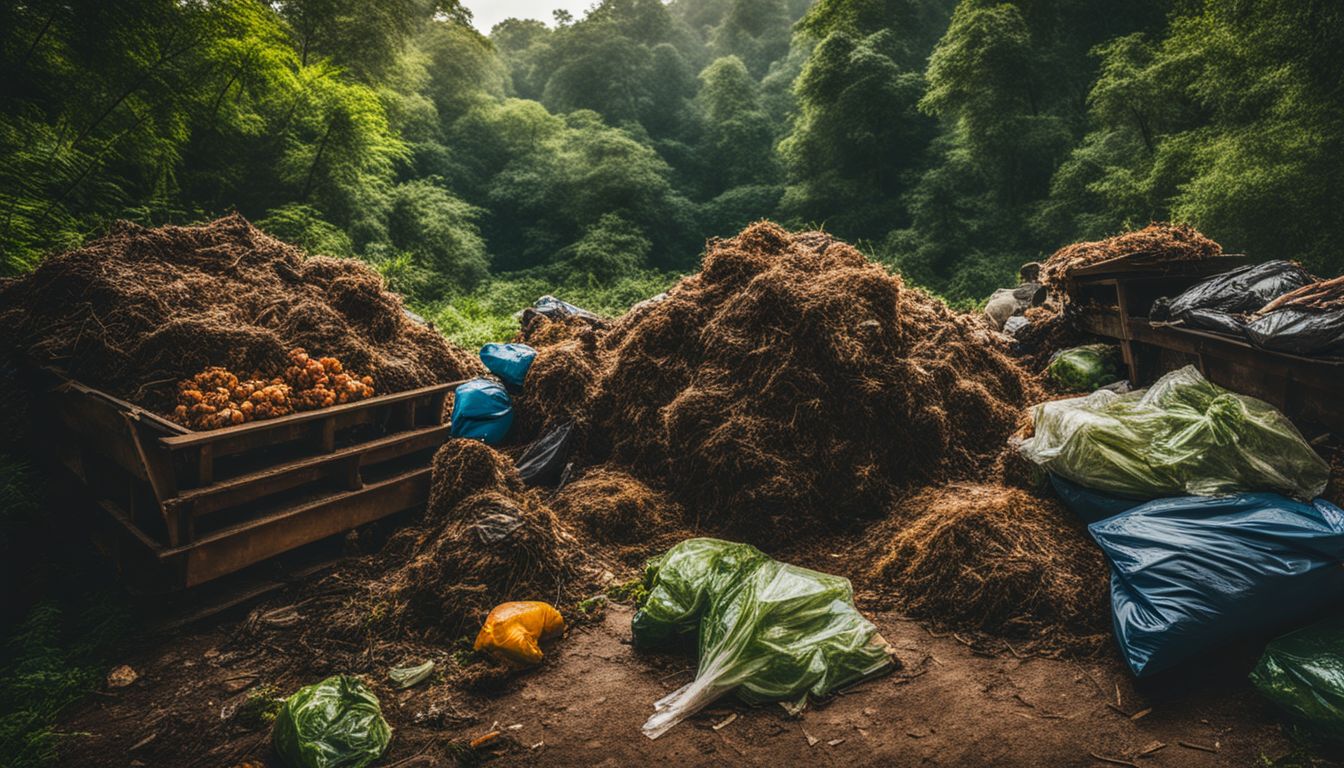
Aerobic composting involves the breakdown of organic waste in the presence of oxygen, while anaerobic composting occurs in an oxygen-free environment. Discover how each process contributes to sustainable waste management and soil fertility.
Aerobic composting process

Aerobic composting is a process where organic waste, like food scraps and yard trimmings, is broken down quickly with the help of oxygen. This type of composting happens in a well-aerated environment, which means there is plenty of air circulating through the compost pile.
The presence of oxygen allows microorganisms to efficiently break down the organic materials into nutrient-rich compost. As the waste decomposes, it releases carbon dioxide instead of methane, reducing greenhouse gas emissions.
Aerobic composting is beneficial because it helps recycle nutrients back into the soil and supports healthy plant growth without the need for chemical fertilizers.
Anaerobic composting process
Anaerobic composting is a different process than aerobic composting. It happens in an environment without oxygen, like in landfills. In anaerobic composting, organic waste breaks down efficiently and produces methane gas as a byproduct.
This methane gas contributes to greenhouse gas emissions and climate change. Food scraps that end up in landfills undergo anaerobic decomposition, releasing harmful gases into the atmosphere.
Unlike aerobic composting, anaerobic composting does not produce nutrient-rich soil or support plant growth effectively. It’s important to divert organic waste from landfills to aerobic composting processes to reduce greenhouse gas emissions and promote sustainable waste management practices.
Summary:
Anaerobic composting occurs in an oxygen-free environment like landfills, where it efficiently breaks down organic waste but releases methane gas as a result. This method lacks the benefits of aerobic composting such as nutrient-rich soil production and supporting plant growth effectively.
Composting Vs Landfill: A Comparison
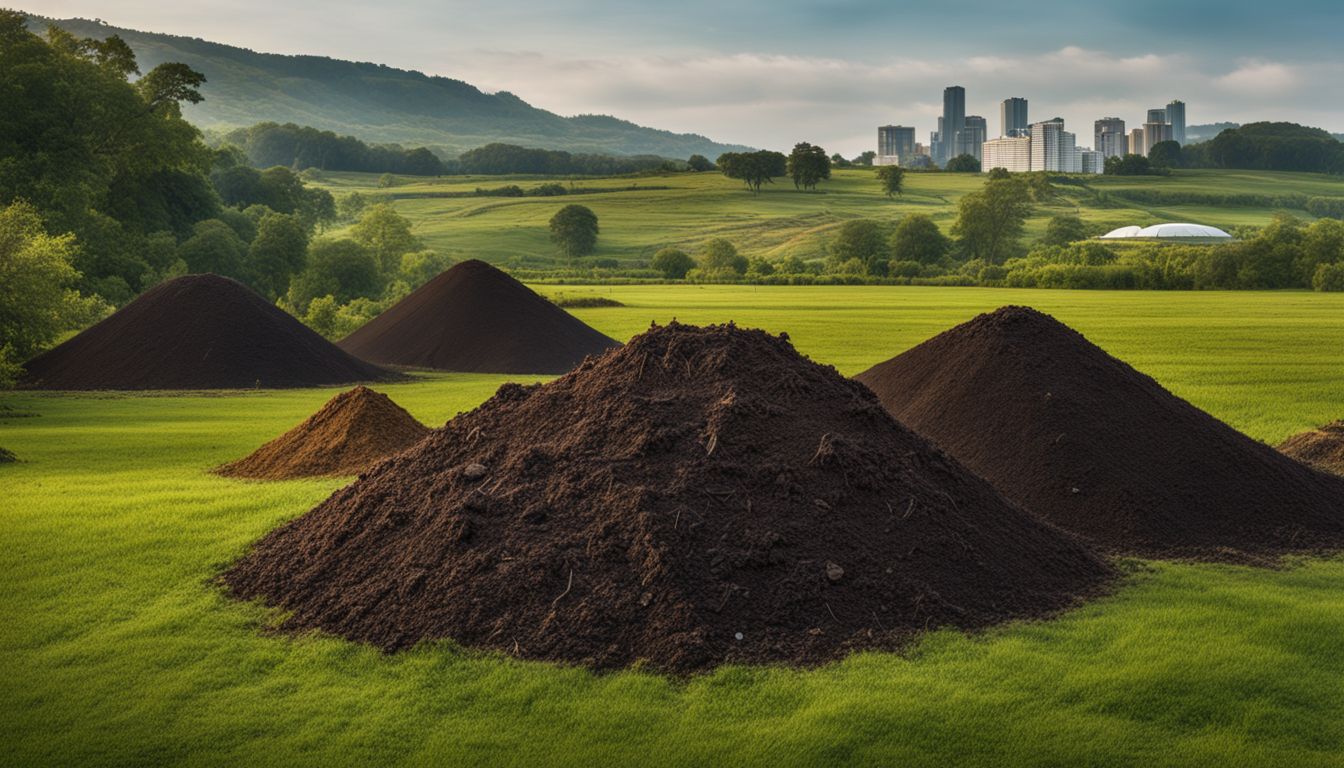
Composting and landfill waste disposal methods differ in their impact on greenhouse gas emissions, decomposition time, and potential for nutrient recycling. Discover the key differences and benefits of composting over landfills.
Read more to learn how you can support sustainable waste management practices.
Time required for decomposition
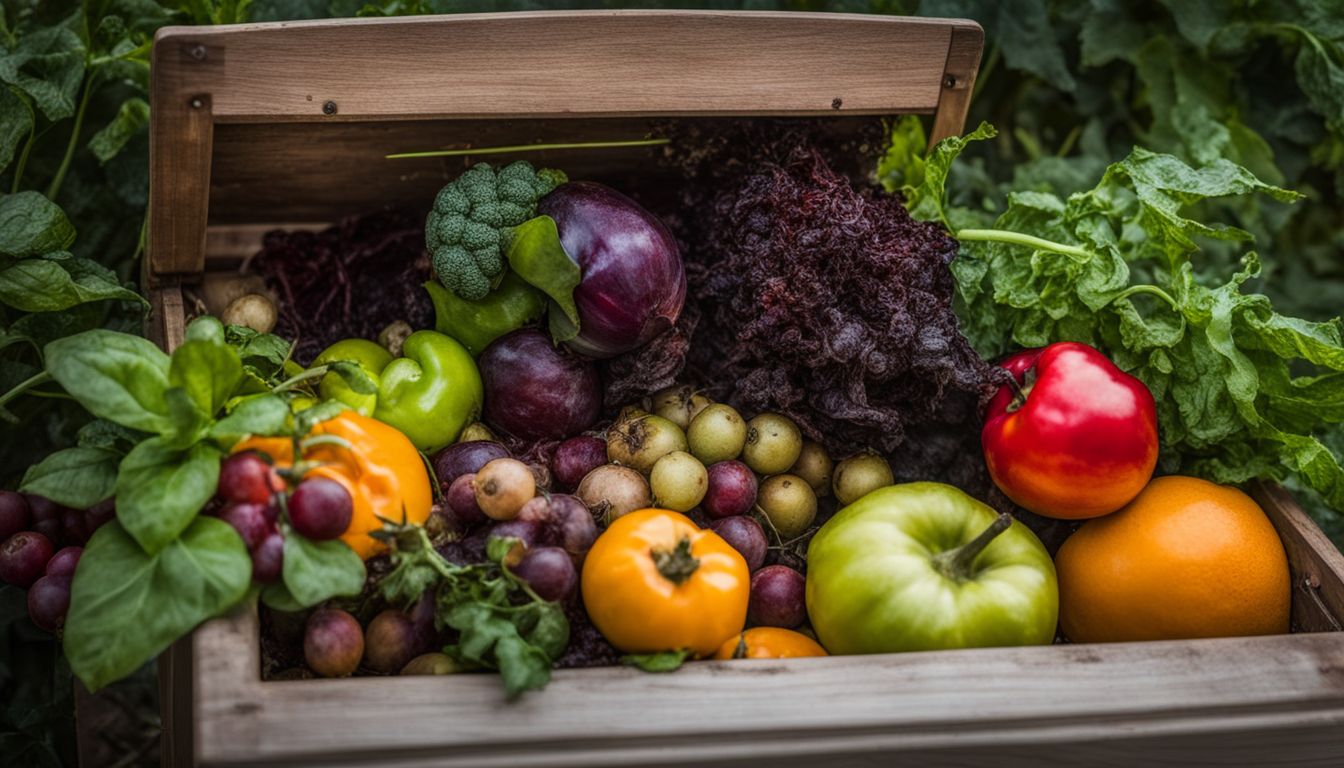
Organic materials break down much faster through composting than in landfills. In the composting process, with the help of oxygen and microorganisms, organic waste can decompose within a few months to a year.
This allows the nutrients from the waste to be recycled back into the soil quickly, helping support plant growth. On the other hand, in landfills, where an anaerobic environment prevails (without oxygen), it takes much longer for organic materials to break down – sometimes decades or even centuries! This slow decomposition process leads to wasted food and missed opportunities for nutrient recycling.
Composting is a more efficient way to handle organic waste and promote sustainability.
Impact on greenhouse gas emissions
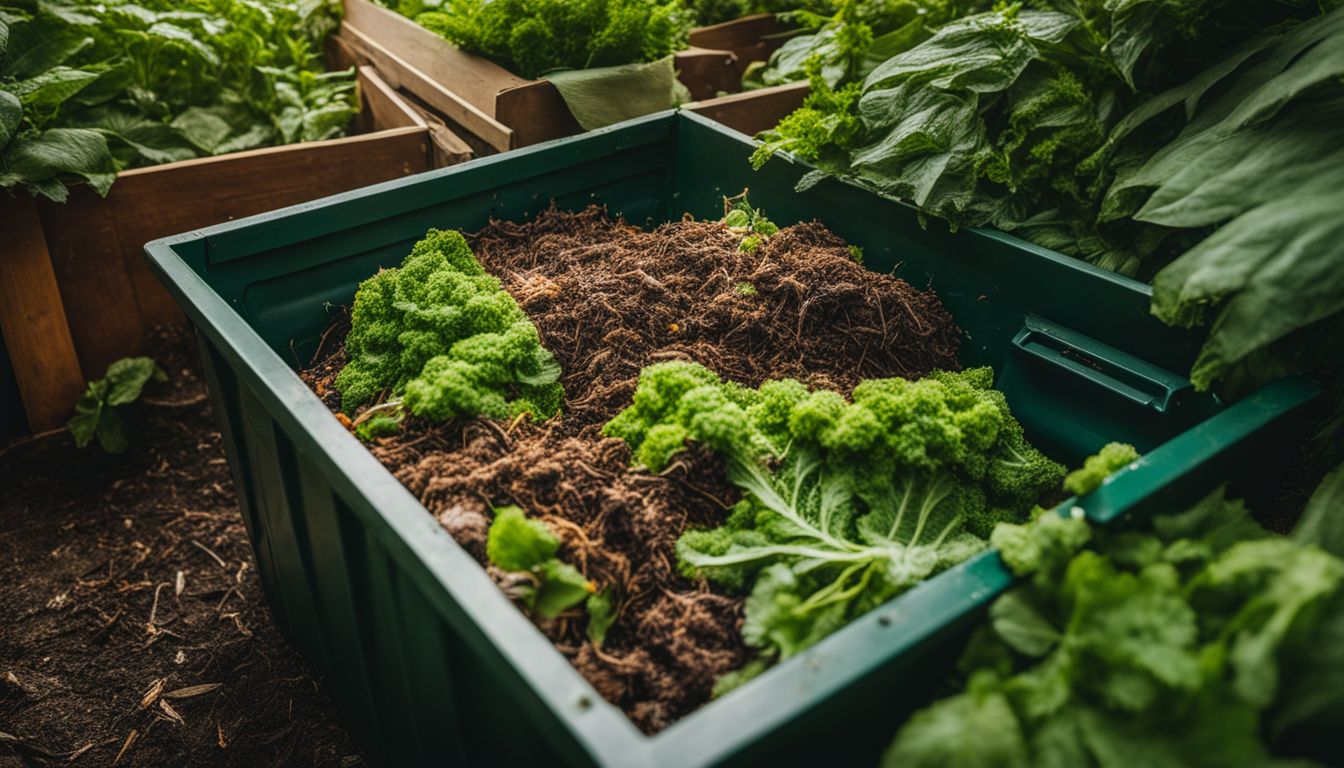
Composting has a positive impact on greenhouse gas emissions. When organic waste is sent to landfills, it decomposes in an anaerobic environment and produces methane, which is a powerful greenhouse gas.
Methane contributes to climate change. However, when organic waste is composted instead of being sent to landfills, it breaks down efficiently in an aerobic environment without producing as much methane.
By diverting organic waste from landfills and promoting composting, we can reduce the amount of greenhouse gases released into the atmosphere and work towards a more sustainable future.
Potential for nutrient recycling

Composting offers the potential for nutrient recycling, making it a valuable practice for sustainable waste management. When organic waste is composted, it breaks down quickly and transforms into nutrient-rich compost.
This compost can then be used to enrich soil and support plant growth. By returning these nutrients back to the earth, we are closing the nutrient cycle and reducing our reliance on chemical fertilizers.
Additionally, compost acts as a carbon sink, trapping carbon and aiding in carbon sequestration. This not only benefits soil fertility but also helps mitigate climate change by reducing greenhouse gas emissions.
Promoting Composting and Reducing Landfill Waste
Educate individuals and communities, implement composting programs, encourage composting in businesses and organizations, and support sustainable waste management practices.
Educating individuals and communities
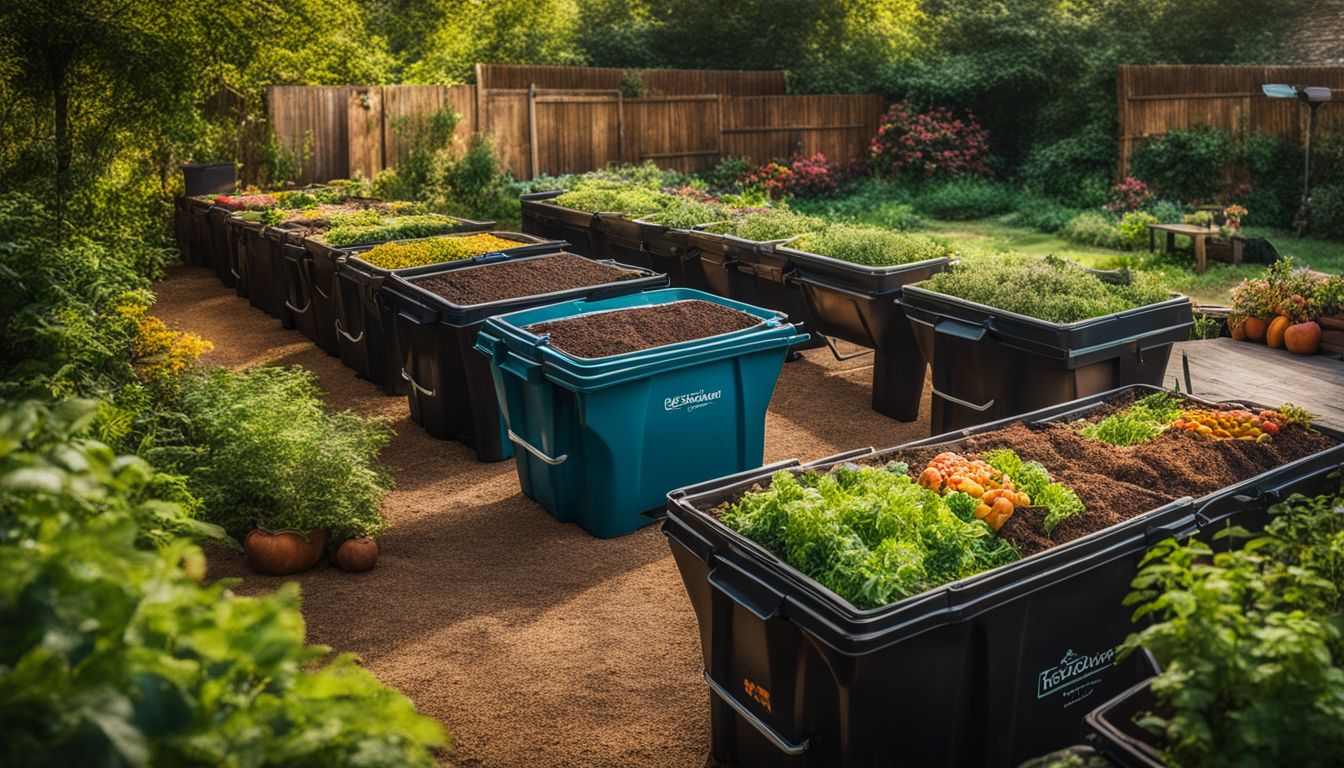
It is crucial to educate individuals and communities about the benefits of composting over landfilling. By raising awareness, people can understand how their actions can have a positive impact on the environment.
They can learn that composting helps to reduce greenhouse gas emissions by diverting organic waste away from landfills. Communities can also implement composting programs and encourage businesses and organizations to participate in sustainable waste management practices.
Through education, individuals and communities can contribute to a more sustainable future by embracing composting as a way to recycle organic waste and support soil fertility.
Implementing composting programs

Cities and counties can play a crucial role in promoting composting by implementing composting programs. These programs provide residents with the resources and information they need to divert organic waste from landfills.
By offering curbside collection of compostable materials, such as food scraps and yard waste, communities can prevent these valuable resources from decomposing in landfills, reducing the generation of methane and other harmful gases.
Additionally, educational initiatives can help raise awareness about the benefits of composting and teach individuals how to properly compost at home. Through these efforts, cities and counties can encourage their residents to embrace sustainable waste management practices and contribute to a more environmentally friendly future.
Encouraging composting in businesses and organizations
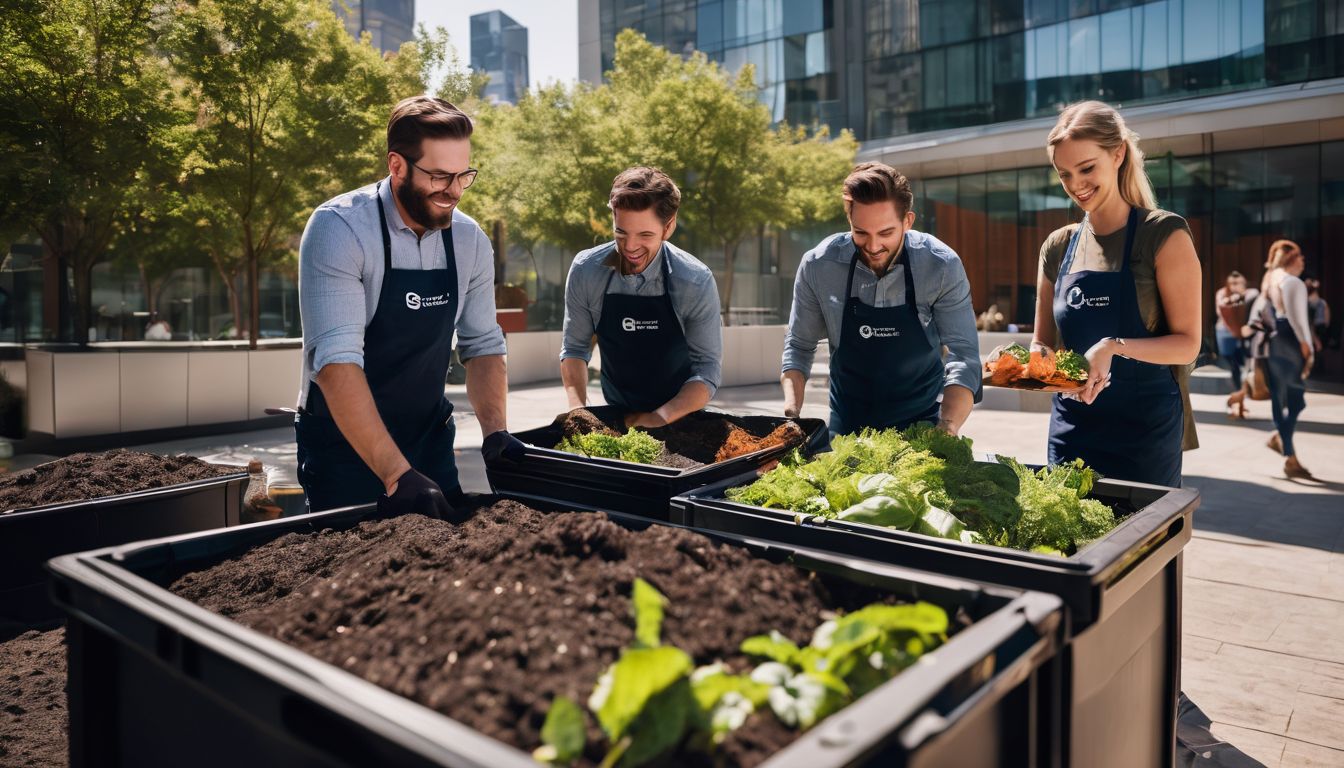
Businesses and organizations play a crucial role in promoting composting and reducing landfill waste. One way to encourage composting is by providing education and awareness about its benefits.
This can be done through workshops, seminars, or informational materials that explain how composting can help reduce greenhouse gas emissions and improve soil quality. Another effective approach is to implement composting programs within these entities.
By providing the necessary equipment and resources, businesses and organizations can make it easier for their employees or members to participate in composting initiatives. Additionally, offering incentives or rewards for those who actively engage in composting can further motivate individuals to take part.
Supporting sustainable waste management practices
To support sustainable waste management practices, it is important to prioritize composting over landfilling. Composting helps divert organic waste away from landfills, reducing greenhouse gas emissions and promoting environmental sustainability.
By transforming organic waste into nutrient-rich compost, we can enrich soil quality and support plant growth. Additionally, by keeping compostable food out of landfills, we can reduce the production of methane gas, a potent greenhouse gas that contributes to climate change.
Implementing composting programs in cities and encouraging businesses and organizations to compost can further contribute to sustainable waste management practices and help close the nutrient cycle by returning organic materials back to the soil.
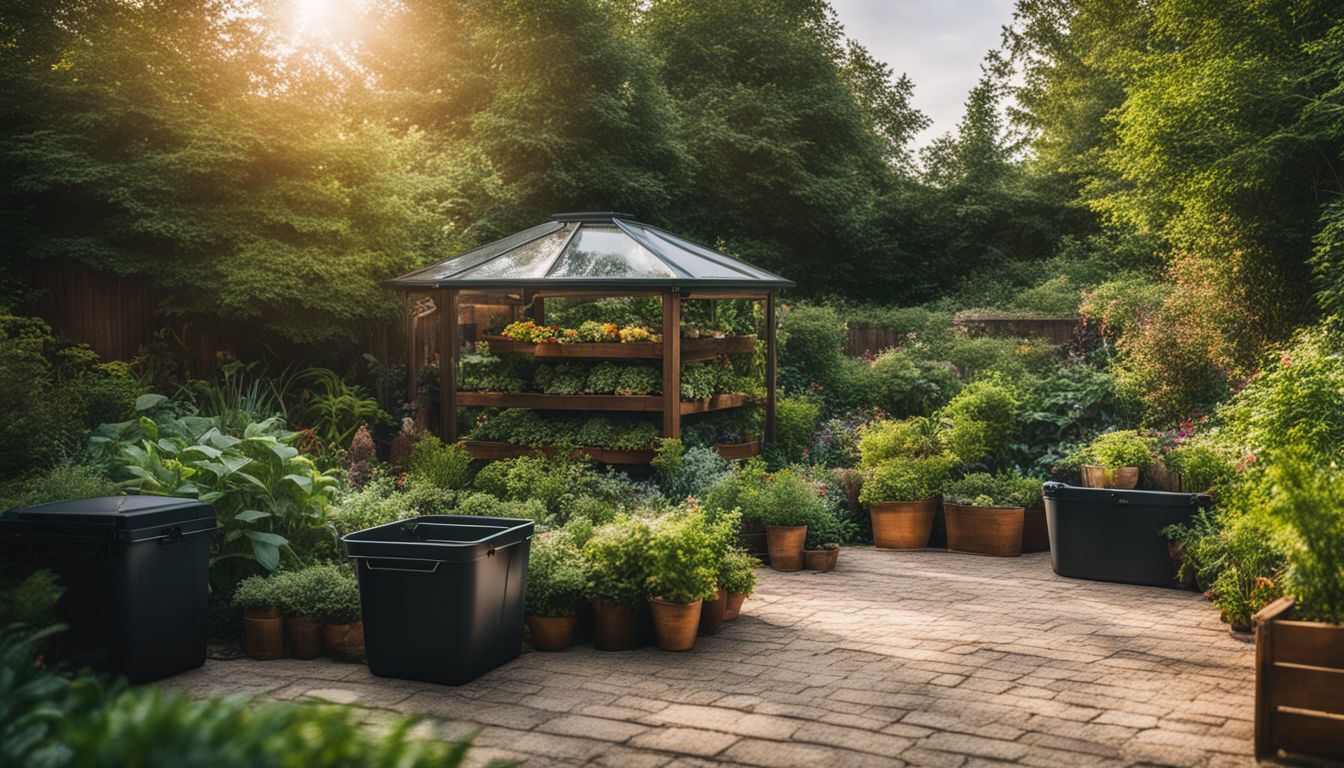
Composting and landfilling are two ways to deal with organic waste, but they have different environmental impacts. Landfills produce methane, a greenhouse gas that contributes to climate change.
They also contaminate water and soil. On the other hand, composting creates nutrient-rich soil that can help plants grow. It reduces methane emissions and the need for chemical fertilizers.
Composting is faster than landfilling because it allows materials to break down quickly and return to the earth’s natural cycles. By promoting composting and reducing landfill waste, we can support sustainable waste management practices and protect our environment.
Composting helps close the nutrient cycle by returning organic materials back to the soil. This supports plant growth and reduces the need for chemical fertilizers in gardens. Food scraps that end up in landfills undergo anaerobic decomposition, which produces methane gas – a potent greenhouse gas that contributes to climate change.
Composting prevents this by keeping organic waste out of landfills and allowing it to break down efficiently instead. Cities and counties that offer composting programs can greatly reduce methane emissions from food scraps decomposing in landfills, thus helping combat climate change.
In conclusion, composting is more environmentally preferable compared to landfilling when it comes to dealing with organic waste like food scraps because it reduces greenhouse gas emissions while producing nutrient-rich soil for plants’ growth without relying on chemical fertilizers or contributing further harm to our planet through contamination of air, water or soils as seen with landfills.
Conclusion: Composting Vs Landfill

Composting is a better choice than landfilling because it helps reduce greenhouse gas emissions and transforms organic waste into nutrient-rich compost. By keeping compostable materials out of landfills, we can contribute to the natural cycles of the earth and support soil fertility.
It’s time to promote composting and sustainable waste management practices to create a healthier environment for ourselves and future generations.
FAQs
1. What is the difference between composting and landfill?
Composting involves breaking down nutrient-rich food items quickly to feed the earth. In contrast, a landfill piles up waste without much efficiency in breakdown.
2. What are compostable items?
Compostable items are biodegradable materials that can be broken down efficiently in a compost pile.
3. Does composting help feed the earth better than a landfill?
Yes, composting turns biodegradable waste into nutrient-rich soil while landfills do not break down waste as quickly or efficiently.
4. Is it better to use a landfill method if we cannot do composting?
No, even though composting is faster at breaking down items, using landfills creates an unhealthy environment due to slow decay rates.

As a dedicated mother and passionate software developer, she weaves her diverse experiences into captivating stories that inspire and engage readers. Emma's love for sustainable living and environmental consciousness permeates both her personal and professional life. When she's not immersed in the world of coding and software development, Emma can be found nurturing her family and tending to her thriving organic garden. Her commitment to sustainable practices extends to every aspect of her life, from repurposing household items to embracing eco-friendly technologies.

